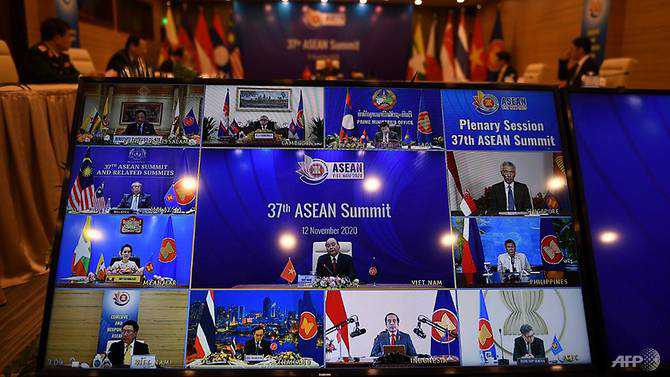Asia-Pacific nations sign world's major trade pact RCEP
15 November, 2020

Fifteen Asia-Pacific nations signed a mega free trade deal on Sunday (Nov 15) as they concluded an annual summit of Southeast Asian leaders and their regional partners, held nearly this year due to the COVID-19 pandemic.
The Regional Comprehensive Economic Partnership (RCEP) may be the world's biggest trade agreement. It'll progressively lower tariffs across many areas in the coming years.
The pact, that was first proposed in 2012, loops in 10 ASEAN economies along with China, Japan, South Korea, New Zealand and Australia.
They make up practically a third of the world's population and account for 29 % of global gross domestic product.
"After eight years of negotiating with blood, sweat and tears, we have finally come to the moment where we will seal the RCEP Agreement this Sunday," Malaysia's trade minister Mohamed Azmin Ali had said ahead of the summit.
Prime Minister Lee Hsien Loong, who led Singapore’s delegation, on Sunday hailed the signing of the RCEP as a "major milestone" and congratulated the 15 participating countries.
"We have reached a significant milestone of signing this agreement today. It has taken us eight years, 46 negotiating meetings and 19 ministerial meetings to get here. I am very grateful for the tireless efforts of ministers and negotiators from all participating countries who've worked so hard through the process.
"The RCEP is a significant step of progress for the world, at a time when multilateralism is losing ground and global growth is slowing," said Mr Lee.
Now, he added, "the effort of implementing the agreement and encouraging our businesses to take full benefit of it begins".
"Just about everyone has made difficult trade-offs to advance the negotiations. And we'll have to work hard to persuade our citizens that the RCEP will benefit them," said Mr Lee.
"But I have without doubt that the RCEP is an advantage for all those, and will help stem the tide against globalization and monetary integration.
"Singapore looks forward to dealing with participating countries on the timely implementation of the momentous agreement," the prime minister added.
The 15 RCEP countries decided on the terms of the deal last year, establishing the path for it to be signed during the summit.
India pulled out of talks last year, worried that the elimination of tariffs would open its markets to a flood of imports that can harm local producers. Other countries have said the entranceway remains open for New Delhi.
Following the signing, all countries would need to ratify the RCEP within 2 yrs before it becomes effective.
The four-day ASEAN summit included meetings between Southeast Asian leaders and their counterparts from China, Japan and South Korea in the ASEAN Plus Three Summit, along with the East Asia Summit and RCEP Summit.
Source: www.channelnewsasia.com
TAG(s):
